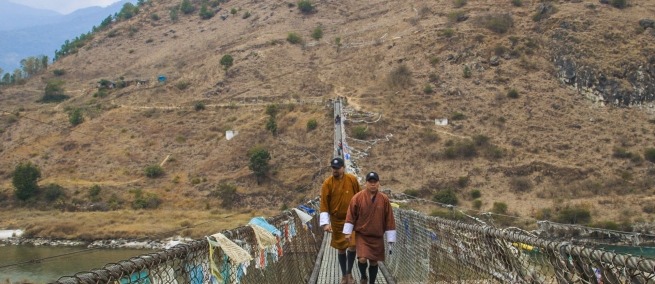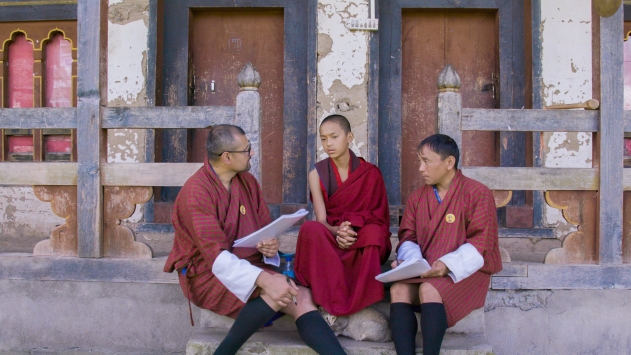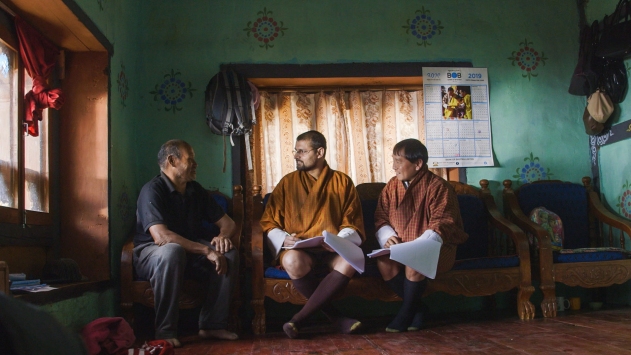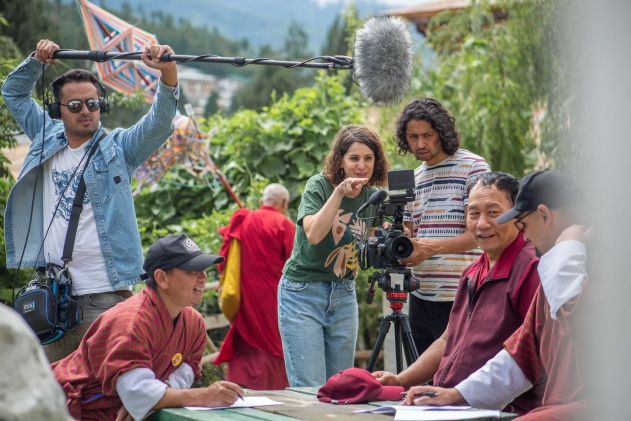
Making its world premiere at Sundance in the World Cinema Documentary Competition, AGENT OF HAPPINESS follows two surveyors—Amber and Guna—as they travel around the country asking a range of inhabitants 148 questions to determine how happy they are. Ultimately, the accumulation of these surveys determines to the Gross National Happiness (GNH), an index created by the king in the 90s that helps determine policy. We spoke with co-directors Arun Bhattarai and Dorottya Zurbó at Sundance about why they chose this subject, what the implications of GNH are, and the filmmaking process.
Science & Film: Can you speak a bit about what your familiarity was with Gross National Happiness before making this film, and what it means in Bhutan?
Arun Bhattarai: For me, Gross National Happiness is a very familiar topic, because I actually grew up listening to GNH in my classroom. I was studying Gross National Happiness, I was listening to the king's speeches about Gross National Happiness, but I never thought too much about it at the time. When I actually started going out of Bhutan, I realized that everybody associates Bhutan with this happy country and GNH. That was actually the beginning of this idea for this film. Dorottya and I did our previous film together, and then we were traveling and every Q&A somebody would ask about this Gross National Happiness. Bhutan is often exoticized as the last Shangri-La, and we wanted to go behind this happy image of Bhutan.
Dorottya Zurbó: We had already made a film together in Bhutan, THE NEXT GUARDIAN, and that was the first time we witnessed two happiness agents, surveyors, conducting the survey with our previous protagonists. We were very impressed by how engaging a conversation they were having, and how much people were enjoying sharing their innermost feelings: how satisfied they are, what are their dreams, what household items they have, what they are struggling with, and we thought that there was a nice energy. At the same time, we also felt that it was kind of a nice extra touch that [the story was] government officials going around the country and trying to measure subjective life experiences, and from the data that they were collecting, they try to use that for policymaking and implementing developments in the country.

Still from AGENT OF HAPPINESS, courtesy of the filmmakers.
S&F: What if people aren’t truthful, wouldn’t that skew policy?
DZ: You never know how honest the people are. But what was really interesting in our experience was that somehow the people were genuinely trying to be very thorough, and very honest, and many times they said that no one really asked these questions of them before. They have kind of a genuine trust towards their government and towards the king. I think that gave a special atmosphere to the survey.
AB: I think they see it as an opportunity to express themselves. For example, you see the teenage girl Yangka who is living in the village with her mom who has alcohol problems. She never shared these thoughts [that we hear in the film] with anyone, not even with her closest friends. When these happiness agents were there and were actually asking her these questions, it kind of gave her a chance to talk about her deeper feelings. The survey itself is fairly complicated, and many of the questions don't actually make sense, I mean, you can't really measure people's happiness. That's what we are also trying to see in the film. We are trying to use this survey as a device to enter into people's lives.
DZ: We're playing with this idea in the film: can we transform a survey like that into numbers? Can we calculate a certain happiness index or happiness profile? An overall happiness index of the country? It is kind of obviously like measuring GDP. Bhutan was trying to transform—they measure happiness instead of GDP.
AB: There are some indicators [in the survey] which are kind of unique. You talk about community vitality, about spirituality as well, environmental protection. Gross National Happiness is based on four pillars: one is good governance, one is sustainable development, protection of environment, and protection of cultural values. Under that there are these nine indicators. It's a good compass, let's say, for development. It's something that you look at and it's like the North Star. But I think what's more important is the process of trying to go and find out when people are happy or not.
DZ: At the end, the idea of the film was that we have these statistics, the data that the country is very proud of, and spends a lot of time calculating. But to translate it into cinematic language, what is behind those numbers? What are those confessions, stories, feelings?

Still from AGENT OF HAPPINESS, courtesy of the filmmakers.
S&F: As filmmakers, you were accompanying these agents on a survey that is public but, as you're saying, is also very intimate where people are sharing thoughts that they haven't even shared with family members. Were participants generally open to your presence? Were you worried about how it might change the survey, or the results?
AB: Yeah, we were worried about it. We were always following Amber and Guna and we were very visible, but initially we would let them talk and then be comfortable and then we would say: we have been following them for months, and just feel comfortable and be yourself.
DZ: We were always saying that if they don't want to be filmed then it's fine, or if there are certain sections or questions they feel are too intimate, then we are not going to record. We wanted to give them the freedom to stop us anytime.
AB: With the side characters like Dechen and Yangka and Tashi and Tshering, we went back to them a lot after the happiness agents left, building a relationship with them, because with them we were shooting more observational moments from their lives. That could evolve more as a deeper relationship.

Behind the Scenes of AGENT OF HAPPINESS, courtesy of the filmmakers.
♦
TOPICS